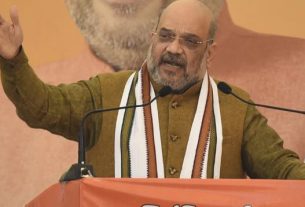After August 5, 2019, when Prime Minister Narendra Modi-led dispensation ended the 70-year-long status quo by merging Jammu and Kashmir completely into the Union of India, J-Ks agriculture sector is witnessing an unprecedented development.
The government after August 5, 2019, has worked hard to clear the impediments that prevented the farmers from making ends meet.
From quality seeds to on-spot help, the UT administration ensured to make agriculture a sustainable and remunerative economic activity for farmers at affordable prices.Their efforts yielded results as the quality of the crops has improved and farmers are getting a good price for their yield.
Agriculture reformations have helped J-K UT to score in the top 5 states/UT in terms of monthly farming revenue. Due to market-trends-oriented farming, horticulture is now a sustainable economic activity.
“Look if we talk about the agri sector of Jammu and Kashmir, we have limitless potential in agriculture. Be it the green revolution, or providing a helping hand to farmers, the contribution of the government and Krishi Vigyan Kendras have changed the way of farming in JK in an innovative way,” Ghulam Mohammad Mir, a farmer from Kreeri area of north Kashmir’s Baramulla district said.
He added that the centrally sponsored schemes were in vogue for 70 years but the so-called special status of J-K acted as the biggest obstacle in their implementation.
“Concerted efforts by the government are opening up doors of opportunity for the farmers like me. Never before had high-density plantation investment in agro-based industries taken place at the kind of speed witnessed in the last two years,” Mir said.
Union Territory has not only achieved a new height of agricultural ground, but the farmer welfare schemes sponsored by the PM Modi such as Kissan Sammaan Nidhi, Kissan Fasal Bima Yojna, PMKSY, e-NAM, SVAMITVA Yojana, etc. have helped to double the farmers income.
Farmers have been taught a lot of new techniques which have helped them in many ways to turn into successful agri-entrepreneurs.
“After August 5, 2019, an enabling environment has been created for transforming J&Ks agriculture and allied sectors. These sectors have been turned vibrant and sustainable. Before 2019, no due attention was given to us. The Centre has always extended a helping hand to J&K but the politicians, who ruled J-K from 1947 to 2019, were not that keen on helping the common man and uplifting his standard of living, now we feel that the farmers are the top priority of the government,” Shabir Ahmad, another farmer said.
Chasfida, an agri-entrepreneur, hailing from Palhallan area of north Kashmir’s Baramulla district is all praise for the officials of the Department of Agriculture. Her efforts have not only changed her fortunes but she has become a role model for other women who visit her for advice.
Acknowledging the departments’ efforts in turning her dream into a reality, Chasfeeda said officials of the Agriculture Department regularly visited her agriculture farm and often provided her suggestions for getting better production.
The government is putting in all the efforts to transform subsistence agriculture into a sustainable commercial agriculture economy with an emphasis on ecosystem services and restoration and sustainable utilization of biodiversity.
Recently, a successful woman Agri-entrepreneur from Baramulla, Safina Mushtaq made news by starting with mushroom cultivation and eventually diversified into flower seedlings and protected cultivation.
Chowdhury Mohammad Iqbal, Director of Agriculture Kashmir visited the farm of Safina Mushtaq, and took stock of the Agriculture scenario at the farm.
The Director of Agriculture congratulated the said woman Agri-entrepreneur for her successful venture and adoption of innovative initiatives during the cultivation of different crops.
“Such success stories encourage more and more educated women towards the agriculture sector with more women taking agriculture and allied sectors as a career option,” Chowdhury Iqbal said.
The director also assured Safina of technical guidance from the department and asked the concerned officers to put in all the necessary efforts so that this success story could be replicated in other districts of the Kashmir division.
It is worth mentioning here that, Lt. Governor J-K in his ‘Awaam ki Awaaz’ programme had appreciated Safina Mushtaq of Baramulla for becoming an agri-entrepreneur after her studies.
Nearly 70 percent of the population in J-K is directly or indirectly engaged in agricultural and allied activities. The government has embarked on the mission to promote ‘agripreneurship’ as a means of high return and respectable employment.
High-density plantation, nutrient management, and widespread adoption of integrated dairy farming schemes are among the other initiatives that have been taken in the past three years.
A strong framework is being developed for farmer-industry connection. It is generating employment opportunities for rural youth to bridge the rural-urban divide. Facilities like cold storage, market linkages, and setting up of food-processing units are encouraging more and more people to become agri-entrepreneurs.__dailygoodmorningkashmir.com





